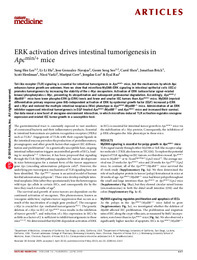Por favor, use este identificador para citar o enlazar este ítem:
https://hdl.handle.net/11000/35486
ERK activation drives intestinal tumorigenesis in Apcmin/+ mice
Título :
ERK activation drives intestinal tumorigenesis in Apcmin/+ mice |
Autor :
Lee, Sung-Hee 
Hu, Li-Li
González-Navajas, Jose Manuel 
Seo, Geom Seog 
Shen, Carol
Brick, Jonathan
Herdman, Scott
Varki, Nissi
Corr, Maripat
Lee, Jongdae 
Raz, Eyal  |
Editor :
Nature Publishing Company |
Departamento:
Departamentos de la UMH::Farmacología, Pediatría y Química Orgánica |
Fecha de publicación:
2010-06 |
URI :
https://hdl.handle.net/11000/35486 |
Resumen :
Toll-like receptor (TLR) signaling is essential for intestinal tumorigenesis in Apc(min/+) mice, but the mechanisms by which Apc enhances tumor growth are unknown. Here we show that microflora-MyD88-ERK signaling in intestinal epithelial cells (IECs) promotes tumorigenesis by increasing the stability of the c-Myc oncoprotein. Activation of ERK (extracellular signal-related kinase) phosphorylates c-Myc, preventing its ubiquitination and subsequent proteasomal degradation. Accordingly, Apc(min/+)/Myd88(-/-) mice have lower phospho-ERK (p-ERK) levels and fewer and smaller IEC tumors than Apc(min/+) mice. MyD88 (myeloid differentiation primary response gene 88)-independent activation of ERK by epidermal growth factor (EGF) increased p-ERK and c-Myc and restored the multiple intestinal neoplasia (Min) phenotype in Apc(min/+)/Myd88(-/-) mice. Administration of an ERK inhibitor suppressed intestinal tumorigenesis in EGF-treated Apc(min/+)/Myd88(-/-) and Apc(min/+) mice and increased their survival. Our data reveal a new facet of oncogene-environment interaction, in which microflora-induced TLR activation regulates oncogene expression and related IEC tumor growth in a susceptible host.
|
Tipo de documento :
info:eu-repo/semantics/article |
Derechos de acceso:
info:eu-repo/semantics/openAccess
Attribution-NonCommercial-NoDerivatives 4.0 Internacional |
DOI :
10.1038/nm.2143 |
Publicado en:
Nat Med. 2010 Jun;16(6):665-70 |
Aparece en las colecciones:
Artículos - Farmacología, Pediatría y Química Orgánica
|
 La licencia se describe como: Atribución-NonComercial-NoDerivada 4.0 Internacional.
La licencia se describe como: Atribución-NonComercial-NoDerivada 4.0 Internacional.
 La licencia se describe como: Atribución-NonComercial-NoDerivada 4.0 Internacional.
La licencia se describe como: Atribución-NonComercial-NoDerivada 4.0 Internacional.
.png)
